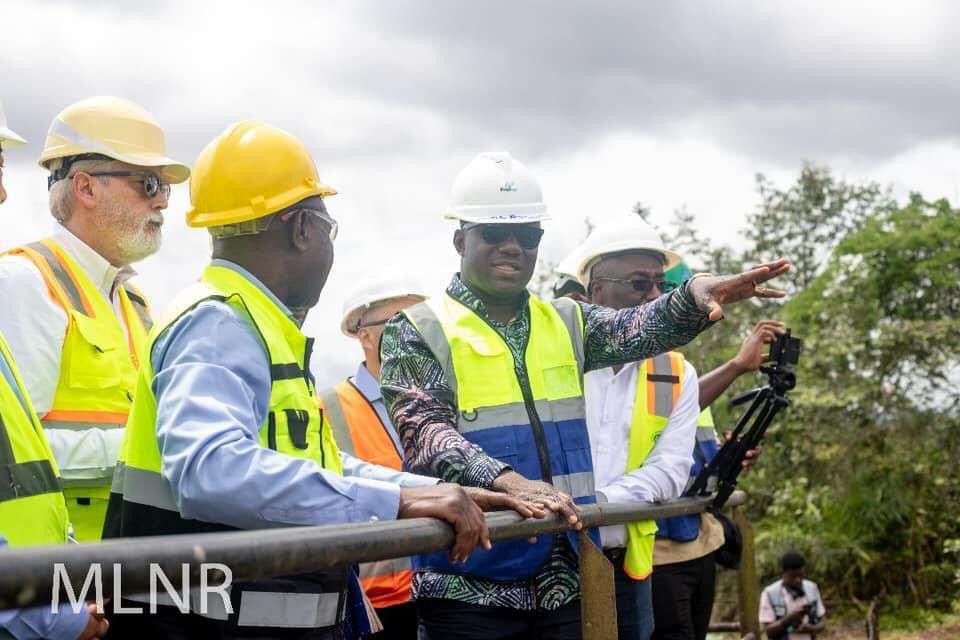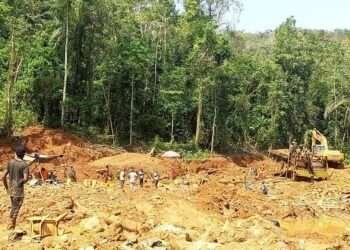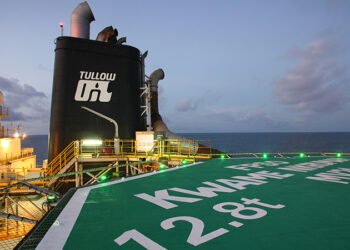President Nana Addo Dankwa Akufo-Addo is set to cut the sod for the construction of a $450 million manganese processing plant at Nsuta in the Western Region on Thursday, November 25, 2024.
This development is part of the government’s broader vision to position Ghana as a hub for the addition of value to its mineral resources, thereby moving away from the longstanding practice of raw mineral exports.
This was disclosed by the Minister for Lands and Natural Resources, Hon. Samuel A. Jinapor, MP, during a media briefing on his tour of the Ghana Manganese Company (GMC) in the Western Region on Wednesday, October 23, 2024.
“The company is working to get its next strategic phase done and far advanced. I am happy to report that we are currently at the concluding phase of beginning the construction of a refinery here in Nsuta.”
Hon. Samuel A. Jinapor, Minister for Lands and Natural Resources
Hon. Jinapor described the project as a “major breakthrough” and a “big deal” for Ghana’s mining industry.
The construction of the refinery marks a significant milestone in Ghana’s mining sector. It is expected to drive substantial economic growth through increased employment, enhanced revenue generation, and the development of downstream industries linked to the manganese sector.
During his tour, Hon. Jinapor revealed that preparations for the commencement of the project are in the final stages, with the government and relevant stakeholders fully committed to ensuring the project kicks off before the end of the year.
The manganese refinery will significantly shift the country’s approach to harnessing its mineral wealth by focusing on value addition rather than the exportation of raw materials.
Hon. Jinapor emphasized that this development aligns with President Akufo-Addo’s broader vision for Ghana’s natural resources, which is centered on value addition to enhance job creation and economic benefits.
He underscored that this is not only a significant achievement for the current government but also a reflection of its commitment to fulfilling campaign promises and ensuring that Ghana maximizes its returns from its vast natural resources.
Economic Impact and Value Addition

The construction of the manganese processing plant will herald a new era for the country’s manganese industry. For decades, Ghana has exported raw manganese to international markets, a practice that has limited the potential economic benefits that could be derived from the mineral.
However, with the construction of the refinery, manganese produced in Ghana will undergo value addition before being exported, allowing the country to capture more value from the supply chain.
“This will mean that products of this company, which have been shipped in their raw form for many years, will now have value addition in Ghana. A lot of work has been done on this matter.”
Hon. Samuel A. Jinapor, Minister for Lands and Natural Resources
Hon. Jinapor further disclosed that teams from both Ghana and China have collaborated closely, visiting each other’s facilities to ensure that the refinery meets the highest international standards.
Once operational, the refinery is expected to boost employment in the local community and the wider region. The value addition process will require skilled labor, creating opportunities for training and development in the mining sector.
Moreover, the establishment of downstream industries to support the manganese refinery will stimulate further economic activity, providing a ripple effect on employment and income generation for thousands of Ghanaians.
Additionally, Hon. Jinapor noted that the project has several legislative steps to finalize, including obtaining parliamentary approval for the fiscal regime governing the refinery’s operations. Once this is secured, Ghana will be well-positioned to move away from raw material exports and retain more value within its economy.
Vision for Ghana’s Mining Sector

Hon. Jinapor made it clear that the construction of the manganese refinery is part of a broader strategic vision that President Akufo-Addo has for Ghana’s mining sector.
Over the past few years, the government has rolled out policies and initiatives aimed at transforming the country’s mining industry by promoting value addition and sustainable resource management.
“This will mean that the centuries of exporting raw manganese will be a thing of the past.
“We are now going to have value addition and retain the reasonably highest end of the value chain of the manganese industry here in Ghana.”
Hon. Samuel A. Jinapor, Minister for Lands and Natural Resources
President Akufo-Addo’s administration has placed significant emphasis on value addition for Ghana’s natural resources as a means to stimulate industrialization and boost domestic revenue.
This strategy, which has been implemented across multiple sectors, reflects the government’s desire to reduce the country’s dependency on exporting raw materials and instead develop a robust industrial base capable of competing globally.
The construction of the $450 million manganese refinery at Nsuta marks a pivotal moment in Ghana’s drive towards industrialization and value addition in the mining sector. Once completed, the refinery will not only boost Ghana’s economic prospects but also position the country as a leader in the global manganese industry.





















